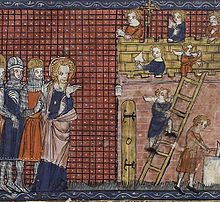The name
Valentinus does not occur in the earliest list of Roman martyrs, compiled by the Chronographer of 354. The feast of St. Valentine was first established in 496 by Pope Gelasius I,
who included Valentine among those "... whose names are justly
reverenced among men, but whose acts are known only to God." As Gelasius
implied, nothing was known, even then, about the lives of any of these
martyrs. The Saint Valentine that appears in various martyrologies in connection with Feb 14 is described either as:
- A priest in Rome,
- A bishop of Interamna (modern Terni), or
- A martyr in the Roman province of Africa.
The first representation of Saint Valentine appeared in the
Nuremberg Chronicle (1493); alongside the woodcut portrait of Valentine, the text states that he was a Roman priest martyred during the reign of Claudius II,
known as Claudius Gothicus. He was arrested and imprisoned upon being
caught marrying Christian couples and otherwise aiding Christians who
were at the time being persecuted by Claudius in Rome. Helping
Christians at this time was considered a crime. Claudius took a liking
to this prisoner – until Valentinus tried to convert the Emperor –
whereupon this priest was condemned to death. He was beaten with clubs
and stoned; when that failed to kill him, he was beheaded outside the Flaminian Gate. Various dates are given for the martyrdom or martyrdoms: 269, 270, or 273.
The official Roman Martyrology for February 14 mentions only one Saint Valentine.
Saint Valentine of Terni oversees the construction of his basilica at Terni, from a 14th century French manuscript (BN, Mss fr. 185)
English eighteenth-century antiquarians Alban Butler and Francis Douce,
noting the obscurity of Saint Valentine's identity, suggested that
Valentine's Day was created as an attempt to supersede the pagan holiday
of Lupercalia. This idea has lately been contested by Professor Jack Oruch of the University of Kansas. Many of the current legends that characterise Saint Valentine were invented in the fourteenth century in England, notably by Geoffrey Chaucer and his circle, when the feast day of February 14 first became associated with romantic love.
While a website of the Russian Orthodox Church Outside Russia and other sources give different lists of Saints Valentine, the Catholic Church's official list of recognized saints, the Roman Martyrology lists seven: a martyr (Roman priest or Terni bishop?) buried on the Via Flaminia (February 14); a priest from Viterbo (November 3); a bishop from Raetia who died in about 450 (January 7); a fifth-century priest and hermit (July 4); a Spanish hermit who died in about 715 (October 25); Valentine Berrio Ochoa, martyred in 1861 (November 24); and Valentine Jaunzarás Gómez, martyred in 1936 (September 18).
I hear people talking about Valentine's Day being of pagan origin, but that is not entirely true. The festival that the pagans celebrated was eventually banished and taken over by Christianity after Valentine was killed.
With reluctance, and the passage of time, more and more Romans
relinquished their pagan festival and replaced it with the Church's holy
day. I would say that is a day to celebrate, don't you think? Makes me wonder how many Romans came to Christ during that time?
I think, not only should we celebrate our loved ones today, but also celebrate God's love. Today's reading was awesome! Please take the time to read it, if you haven't. Here is the Reflection...
BLAMING AND CLAIMING
"Make no mistake about this." –James 1:16
God gets blamed for temptations (Jas 1:13), tragedies, and all sorts
of problems. Just because He created everything, gave us free will, and
allows us to use and abuse our freedom doesn't mean that God is to blame
for the wages of our sins (see Rm 6:23).
On the other hand, God
doesn't often get the credit for "every worthwhile gift, every genuine
benefit" (Jas 1:17). We claim we've earned our blessings. Even if we
admit that God had something to do with them, we may still say that God
helps those who help themselves. In this way, we take part of the credit
for the good things God gives us.
The fact is that we can do
nothing without Jesus (Jn 15:5) and cannot name anything good that we
have not received from God (1 Cor 4:7; Jas 1:17). "If, then, you have
received it, why are you boasting as if it were your own?" (1 Cor 4:7)
Let's
quit blaming God for problems and taking credit for His blessings. We
should pray: "Not to us, O Lord, not to us but to Your name give glory
because of Your kindness, because of Your truth" (Ps 115:1). "Only in
the Lord are just deeds and power" (Is 45:24). To God be glory!
| PRAYER: | Father, may I be honest with You, myself, and others. |
| PROMISE: | "Happy the man whom You instruct, O Lord, whom by Your law You teach, giving him rest from evil days." –Ps 94:12-13 |
| PRAISE: | Sts. Cyril and Methodius worked together both as brothers in the flesh and brothers in Christ.
|

No comments:
Post a Comment